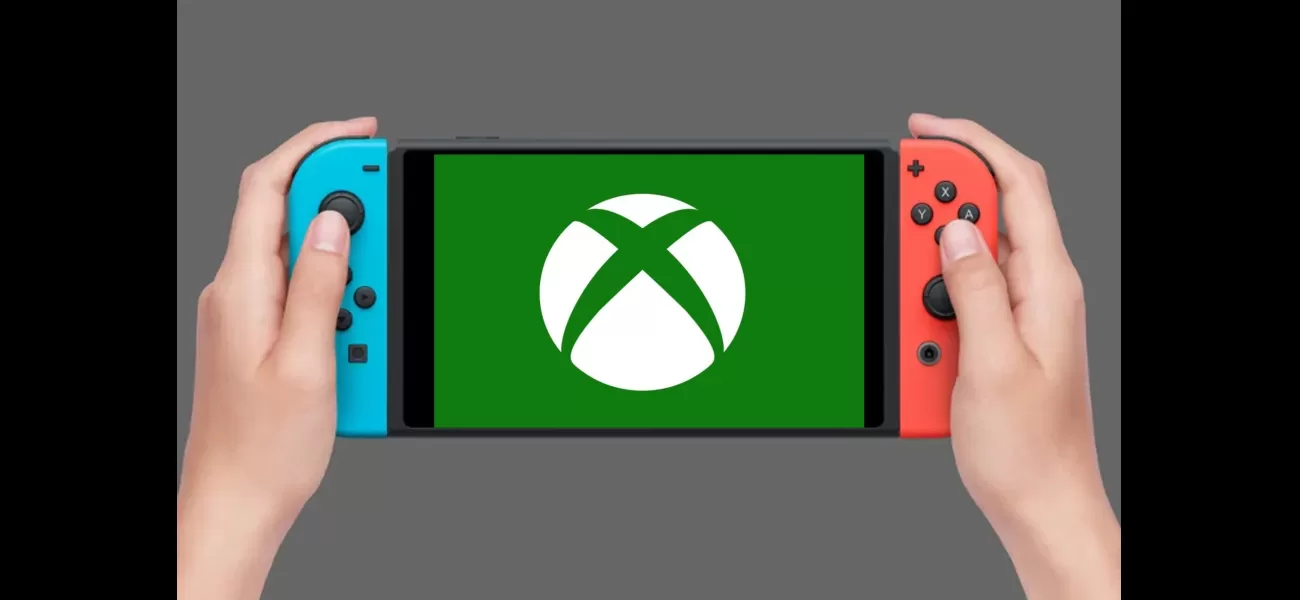Game Inbox: Xbox can learn from Nintendo, discussing the age of Battlefield, and wondering when the second trailer for GTA 6 will be released.
The Thursday letters page has a harsh view towards Xbox boss Phil Spencer, while also praising the positive reviews for Kingdom Of The Planet Of The Apes.
May 9th 2024.

Is there a lesson to be learned by Xbox from Nintendo's success? The opinions on the Thursday letters page seem to suggest so, as one reader praises the reviews of Kingdom Of The Planet Of The Apes while showing no sympathy for Xbox boss Phil Spencer. If you want to join in on the discussions, you can email us at the given address.
The recent Microsoft controversy has shed light on the stark contrast between the Western and Japanese games industry. While both are run by profit-driven businessmen, Nintendo seems to have a better grasp on restraint and long-term planning. It's almost comical to watch Western publishers rush towards a potential industry crash, if it weren't for the destructive consequences.
So, what is the secret to Nintendo's success? Simply put, they consistently make great games. They also strive to innovate, not just in terms of hardware, but also gameplay and design. And perhaps the most impressive aspect is that they achieve all this with relatively smaller budgets. In comparison, Xbox has failed to deliver on their promise of quality games for two generations in a row.
One could argue that Nintendo's success lies in their ability to keep their budgets in check. While their games may not have the same blockbuster status as those of other publishers, they still manage to make a profit. On the other hand, Western companies have reached a point where it's almost impossible to make a profit, leading to massive layoffs. The only exception seems to be Square Enix, who has also faced financial troubles.
However, this doesn't mean that Japanese companies are saints. They too are in the business for the money, but they have found a way to run their business without sacrificing the well-being of their employees and the industry as a whole. It's about time that Xbox learns this lesson, but it's doubtful if they're even paying attention. For a company that has been in the gaming industry for so long, they seem to be quite incompetent.
Moving on, the recent statement by Mike Ybarra defending Phil Spencer as the true victim of the developer-closure situation has raised eyebrows. It's hard to feel sorry for a multi-millionaire CEO when hundreds of developers are losing their jobs due to poor business decisions made by him and other Microsoft executives. Yet, here we are, expected to sympathize with Phil as he has to do the unpleasant task of firing people.
So, the next time you feel a pang of pity for those hardworking developers who are struggling to make ends meet, think about poor old Phil. He's probably sitting in his mansion, crying into his Battletoads t-shirt. But if you're reading this, Phil, I hope you feel better soon!
The recent events have also shed light on the stark contrast between the actions of Sony and Xbox. While both companies have spent billions on acquiring new companies, the aftermath has been vastly different. Sony has shown their love for their developers by taking a pay cut when the board was considering layoffs. On the other hand, Xbox seems to be following the same path as other Western publishers, resulting in massive job cuts.
The discussion then moves on to the inevitable and imminent industry crash. While we can't predict the future, it's clear that the cost of making games is constantly increasing, and the number of games worth making is decreasing. We'll delve deeper into this topic in our upcoming newsletter.
Lastly, the new Battlefield game from EA has caught many by surprise. Despite numerous attempts, the franchise has never been able to reach the same level of success as Call of Duty. With their target audience now in their mid-30s, it's hard to say if the franchise still resonates with the younger generation. However, it's not our problem, and only time will tell if EA's gamble pays off.
In conclusion, it's safe to say that 2021 has been a tumultuous year for Microsoft. The numerous controversies and layoffs have only highlighted their flaws as a company. It's a shame that they didn't take the time to build their first-party studios and instead tried to buy their way to success. The consequences of their actions are now evident, and it's hard to feel sorry for a company that prioritizes profits over the well-being of their employees and the industry as a whole.
Should Xbox take a page out of Nintendo's book and learn from their approach? The letters page in Thursday's issue of the newspaper showed little sympathy for Xbox boss Phil Spencer. However, one reader was celebrating the positive reviews for the game "Kingdom Of The Planet Of The Apes." If you want to join in on the discussions, you can email your thoughts to the provided email address.
One reader points out that one good thing has come out of all the chaos surrounding Microsoft lately – a newfound respect for Nintendo and the Japanese games industry. Although they are still run by greedy businessmen, they seem to have some sense of restraint and long-term planning, unlike Microsoft and other Western publishers who seem to be rushing towards a potential industry crash. Nintendo's success can be attributed to consistently creating great games, trying to innovate, and focusing on hardware. On the other hand, Xbox has failed to do so for two generations in a row.
What sets Nintendo apart is their ability to produce great games on a smaller budget. While most publishers are focused on creating expensive triple-A blockbusters, half of Nintendo's games are AA. This shows that it is possible to be successful without overspending. Japanese companies are in it for the money, but they prioritize creating quality games without sacrificing their employees or the industry as a whole. It's about time Xbox learns this lesson, but it seems like they haven't been paying attention despite being in the gaming industry for a long time.
Another letter writer commends Mike Ybarra for speaking the truth about the recent developer closures at Xbox. While many are feeling sorry for the hundreds of employees who will lose their jobs, the real victim is multimillionaire CEO Phil Spencer. It's easy to forget about the hardworking people losing their jobs, but we should also consider the burden of leadership and how difficult it must be for Spencer to make those tough decisions. The writer sarcastically suggests that Spencer is probably crying in his mansion and wearing a Battletoads t-shirt while reading this.
The next letter writer brings up the recent news of layoffs at Sony and Xbox, which seems to contradict their previous statements about loving their developers and how acquiring companies is good for the gaming industry. They suggest that Sony and Xbox should follow Nintendo's example – when the Wii U was struggling, the board members took a pay cut instead of letting employees go. It's hard to see why anyone would want to work for PlayStation or Xbox given their current situations.
One reader asks for more details about the predicted "inevitable and imminent industry crash." While the writers don't claim to have all the answers, they believe that the increasing cost of making games and the shrinking number of games worth making could lead to a crash. This is evident in Xbox's recent actions and the failed attempt at competing with Call of Duty with the Battlefield franchise.
Lastly, a reader reflects on Microsoft's disastrous year and how they have made one mistake after another. They mention the failed attempt at acquiring Activision Blizzard and warn that the cuts may not be over. Any studio making AA games is at risk, including Double Fine and Ninja Theory. The reader believes that Microsoft's impatience and constant search for shortcuts to success have led to this point. They could have built up their first-party studios from the start, but instead, they have wasted time and money with little to show for it. The reader also points out that Microsoft's recent acquisition spree has come at a high cost, both in terms of investor skepticism and lost jobs. They find it absurd and offensive to expect sympathy for Phil Spencer in this situation.
The recent Microsoft controversy has shed light on the stark contrast between the Western and Japanese games industry. While both are run by profit-driven businessmen, Nintendo seems to have a better grasp on restraint and long-term planning. It's almost comical to watch Western publishers rush towards a potential industry crash, if it weren't for the destructive consequences.
So, what is the secret to Nintendo's success? Simply put, they consistently make great games. They also strive to innovate, not just in terms of hardware, but also gameplay and design. And perhaps the most impressive aspect is that they achieve all this with relatively smaller budgets. In comparison, Xbox has failed to deliver on their promise of quality games for two generations in a row.
One could argue that Nintendo's success lies in their ability to keep their budgets in check. While their games may not have the same blockbuster status as those of other publishers, they still manage to make a profit. On the other hand, Western companies have reached a point where it's almost impossible to make a profit, leading to massive layoffs. The only exception seems to be Square Enix, who has also faced financial troubles.
However, this doesn't mean that Japanese companies are saints. They too are in the business for the money, but they have found a way to run their business without sacrificing the well-being of their employees and the industry as a whole. It's about time that Xbox learns this lesson, but it's doubtful if they're even paying attention. For a company that has been in the gaming industry for so long, they seem to be quite incompetent.
Moving on, the recent statement by Mike Ybarra defending Phil Spencer as the true victim of the developer-closure situation has raised eyebrows. It's hard to feel sorry for a multi-millionaire CEO when hundreds of developers are losing their jobs due to poor business decisions made by him and other Microsoft executives. Yet, here we are, expected to sympathize with Phil as he has to do the unpleasant task of firing people.
So, the next time you feel a pang of pity for those hardworking developers who are struggling to make ends meet, think about poor old Phil. He's probably sitting in his mansion, crying into his Battletoads t-shirt. But if you're reading this, Phil, I hope you feel better soon!
The recent events have also shed light on the stark contrast between the actions of Sony and Xbox. While both companies have spent billions on acquiring new companies, the aftermath has been vastly different. Sony has shown their love for their developers by taking a pay cut when the board was considering layoffs. On the other hand, Xbox seems to be following the same path as other Western publishers, resulting in massive job cuts.
The discussion then moves on to the inevitable and imminent industry crash. While we can't predict the future, it's clear that the cost of making games is constantly increasing, and the number of games worth making is decreasing. We'll delve deeper into this topic in our upcoming newsletter.
Lastly, the new Battlefield game from EA has caught many by surprise. Despite numerous attempts, the franchise has never been able to reach the same level of success as Call of Duty. With their target audience now in their mid-30s, it's hard to say if the franchise still resonates with the younger generation. However, it's not our problem, and only time will tell if EA's gamble pays off.
In conclusion, it's safe to say that 2021 has been a tumultuous year for Microsoft. The numerous controversies and layoffs have only highlighted their flaws as a company. It's a shame that they didn't take the time to build their first-party studios and instead tried to buy their way to success. The consequences of their actions are now evident, and it's hard to feel sorry for a company that prioritizes profits over the well-being of their employees and the industry as a whole.
Should Xbox take a page out of Nintendo's book and learn from their approach? The letters page in Thursday's issue of the newspaper showed little sympathy for Xbox boss Phil Spencer. However, one reader was celebrating the positive reviews for the game "Kingdom Of The Planet Of The Apes." If you want to join in on the discussions, you can email your thoughts to the provided email address.
One reader points out that one good thing has come out of all the chaos surrounding Microsoft lately – a newfound respect for Nintendo and the Japanese games industry. Although they are still run by greedy businessmen, they seem to have some sense of restraint and long-term planning, unlike Microsoft and other Western publishers who seem to be rushing towards a potential industry crash. Nintendo's success can be attributed to consistently creating great games, trying to innovate, and focusing on hardware. On the other hand, Xbox has failed to do so for two generations in a row.
What sets Nintendo apart is their ability to produce great games on a smaller budget. While most publishers are focused on creating expensive triple-A blockbusters, half of Nintendo's games are AA. This shows that it is possible to be successful without overspending. Japanese companies are in it for the money, but they prioritize creating quality games without sacrificing their employees or the industry as a whole. It's about time Xbox learns this lesson, but it seems like they haven't been paying attention despite being in the gaming industry for a long time.
Another letter writer commends Mike Ybarra for speaking the truth about the recent developer closures at Xbox. While many are feeling sorry for the hundreds of employees who will lose their jobs, the real victim is multimillionaire CEO Phil Spencer. It's easy to forget about the hardworking people losing their jobs, but we should also consider the burden of leadership and how difficult it must be for Spencer to make those tough decisions. The writer sarcastically suggests that Spencer is probably crying in his mansion and wearing a Battletoads t-shirt while reading this.
The next letter writer brings up the recent news of layoffs at Sony and Xbox, which seems to contradict their previous statements about loving their developers and how acquiring companies is good for the gaming industry. They suggest that Sony and Xbox should follow Nintendo's example – when the Wii U was struggling, the board members took a pay cut instead of letting employees go. It's hard to see why anyone would want to work for PlayStation or Xbox given their current situations.
One reader asks for more details about the predicted "inevitable and imminent industry crash." While the writers don't claim to have all the answers, they believe that the increasing cost of making games and the shrinking number of games worth making could lead to a crash. This is evident in Xbox's recent actions and the failed attempt at competing with Call of Duty with the Battlefield franchise.
Lastly, a reader reflects on Microsoft's disastrous year and how they have made one mistake after another. They mention the failed attempt at acquiring Activision Blizzard and warn that the cuts may not be over. Any studio making AA games is at risk, including Double Fine and Ninja Theory. The reader believes that Microsoft's impatience and constant search for shortcuts to success have led to this point. They could have built up their first-party studios from the start, but instead, they have wasted time and money with little to show for it. The reader also points out that Microsoft's recent acquisition spree has come at a high cost, both in terms of investor skepticism and lost jobs. They find it absurd and offensive to expect sympathy for Phil Spencer in this situation.
[This article has been trending online recently and has been generated with AI. Your feed is customized.]
[Generative AI is experimental.]
0
0
Submit Comment





